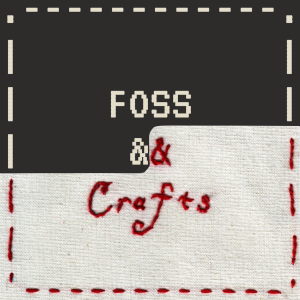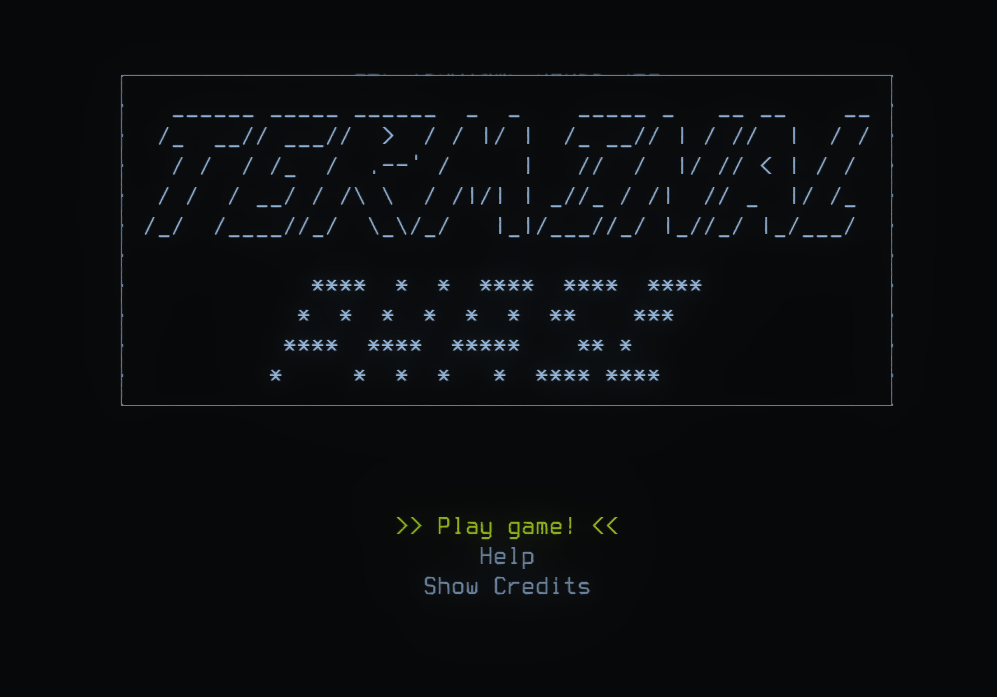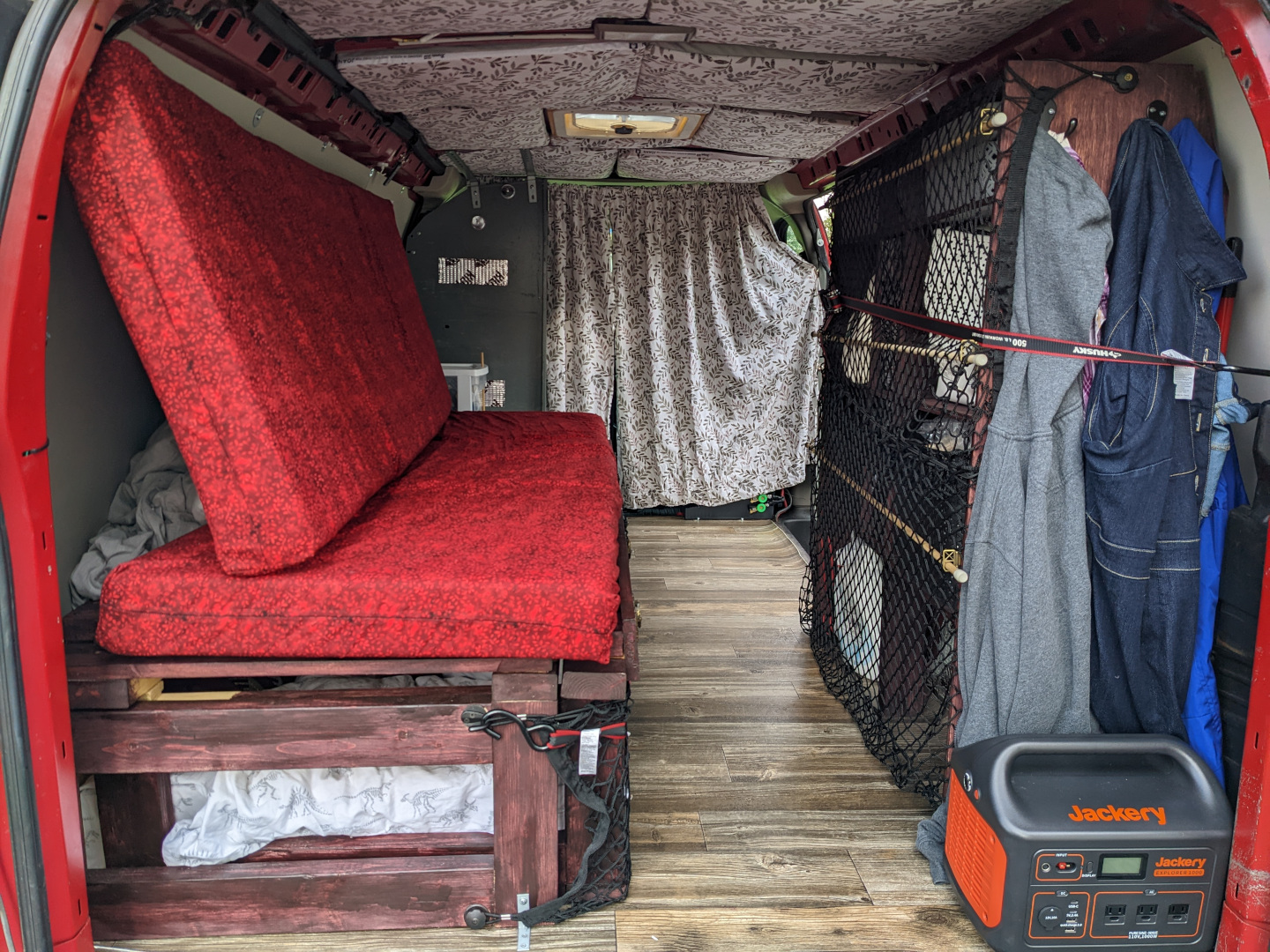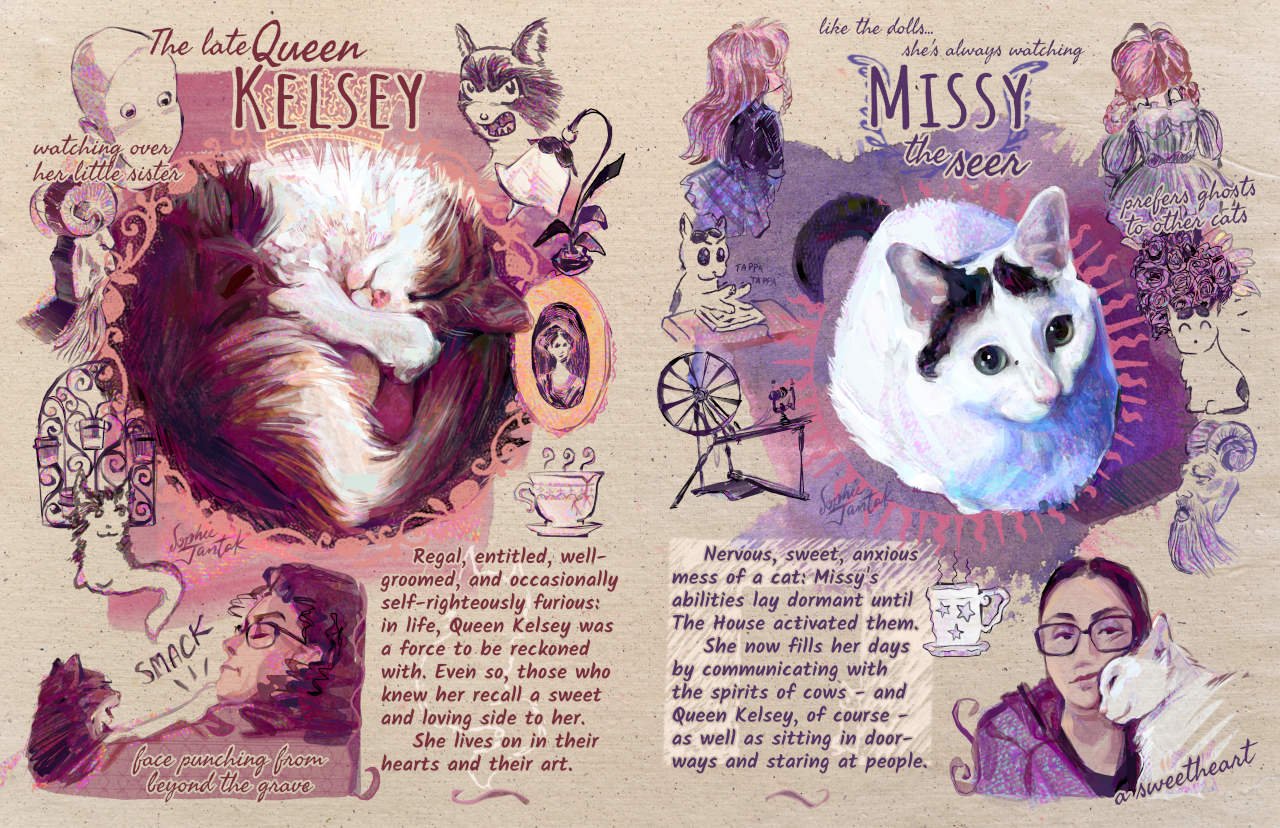The Archive
- 62: BlenderSun 03 March 2024
Blender, the absolute powerhouse of FOSS 3d (and increasingly 2d) graphics! We give an overview of the software's history, some personal history of our relationships to the software, what it can do, and where we're excited to see it go!
- 61: A Textile Historian's Survival GuideSun 10 December 2023
How do you survive in a world that is no longer optimized for making your own clothing when you suddenly find that modern conveniences no longer accommodate you? As a textile historian, Morgan has been ruminating for years about women’s contributions to the domestic economy, the massive time investment of producing clothing for a family, and the comparative properties of different textile fibers. These research interests were informed by a lifetime of sewing and other fiber crafts. None of this experience, however, properly prepared her to face the reality of needing to rely on her own hands to provide large portions of her own wardrobe.
- 60: Governance, part 2Sat 30 September 2023
Back again with governance... part two! (See also: part one!) Here we talk about some organizations and how they can be seen as "templates" for certain governance archetypes.
- 59: Governance, part 1Thu 31 August 2023
Governance of FOSS projects, a two parter, and this is part one! Here we talk about general considerations applicable to FOSS projects! (And heck, these apply to collaborative free culture projects too!)
- 58: WebAssemblyThu 15 June 2023
WebAssembly! You've probably heard lots about it, but what the heck is it? Is it just for C and Rust programs? Can you write it by hand? (Do you want to?) And wait, how is Spritely getting involved in WebAssembly efforts? Find out!
- 57: F-Droid (featuring Sylvia van Os & Hans-Christoph Steiner!)Sun 14 May 2023
F-Droid, a repository of free software for your Android devices! Christine interviews F-Droid developers Sylvia van Os and Hans-Christoph Steiner as well as F-Droid board member and chair... Morgan Lemmer-Webber!
- 56: Make your own dehydrated mealsTue 28 February 2023
In yet another deep dive into yet another weird hobby of Christine's, we talk about how to make your own dehydrated meals! Why the heck would you want to do this? Well, maybe you want more consistent or dietary needs friendly travel food! Maybe you want to go camping or hiking! Maybe you're sick of deciding what's for lunch and you just want to scoop a cup of meal out of a jar on your desk every day! Maybe you want to weird out your fellow conference-goers as you turn a dry powder into a fully cooked meal with hot water and hot water alone!
- 55: Free Soft WearTue 31 January 2023
Morgan talks about "Free Soft Wear": textile processes under free culture licenses!
- 54: Oops!Tue 27 December 2022
Everyone goofs sometimes. Today we talk accidents... some happy, some not!
- 53: Fediverse reflections while the bird burnsThu 01 December 2022
Twitter is burning, and people are flocking to the fediverse. Is the fediverse ready though? How did we get here? Where should we be going? Since Christine is co-author of ActivityPub, the primary protocol used by the fediverse, Morgan decides it's time to get Christine's thoughts recorded and out there... so we hop in the car as we talk all about it!
- 52: Terminal Phase: a space shooter that runs in your terminal!
- 51: #vanlife...?
- 50: The Spritely Institute
- 49: Lisp but Beautiful; Lisp for EveryoneThu 14 July 2022
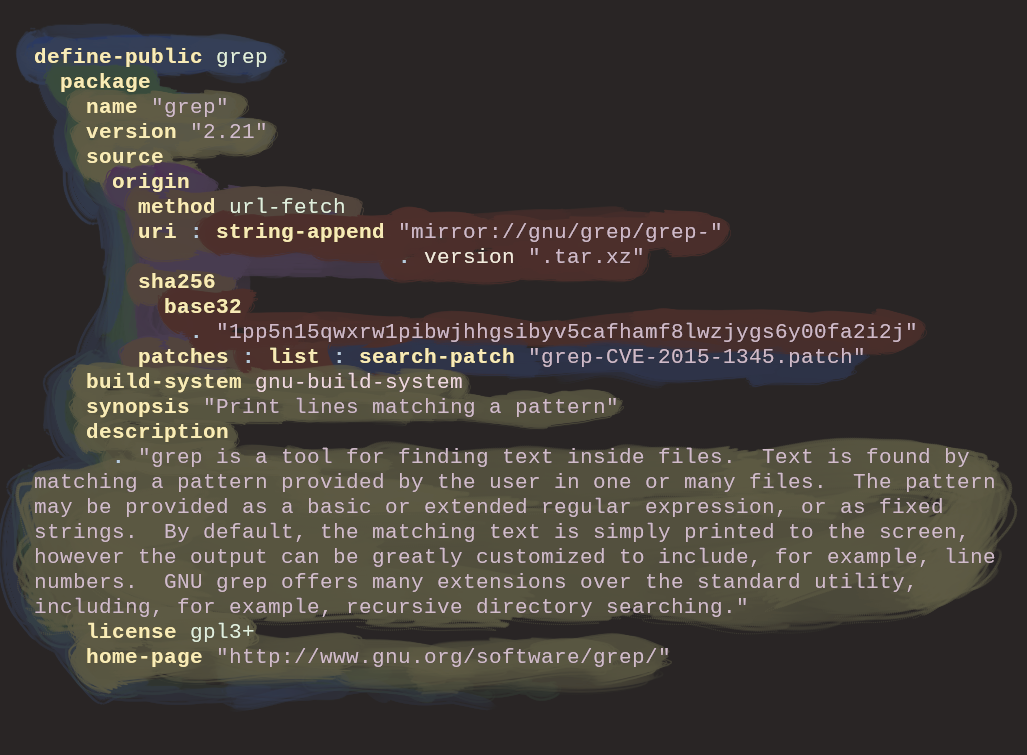
- 48: Sophie Jantak on pet portraits and Blender's Grease Pencil
- 47: What is Lisp?Thu 23 June 2022
This episode is all about the Lisp family of programming languages! Ever looked at Lisp and wondered why so many programmers gush about such a weird looking programming language style? What's with all those parentheses? Surely there must be something you get out of them for so many programming nerds to gush about the language! We do a light dive into Lisp's history, talk about what makes Lisp so powerful, and nerd out about the many, many kinds of Lisps out there!
- 46: Mark S. Miller on Distributed Objects, Part 1Tue 31 May 2022
Calling all programming language nerds! Distinguished computer scientist Mark S. Miller (presently at Agoric) joins us to tell us all about distributed object programming languages and their history! We talk about actors, a bit of Xanadu, and little known but incredibly influential programming languages like Flat Concurrent Prolog, Joule, and E!
- 45: A high level introduction to cryptographyWed 25 May 2022
In this episode we give a very (very) high level introduction to cryptography concepts. No math or programming background required!
- 44: Celebrating a Decade of GuixSat 30 April 2022
Guix turns ten! We celebrate Guix's first decade by highlighting ten great things about Guix! Hear all about functional package management, time-traveling operating systems, and why "Composable DSLs" are great!
- 43: Repetitive Strain InjuriesThu 31 March 2022
This week we’re talking about Repetitive Strain Injuries (RSI). Christine and Morgan tell their stories bout over-using their wrists from programming (prodded along by an injury) and writing academic papers respectively. We discuss what you can do to treat or minimize the effects of these injuries then cap it off with a discussion of RSI gloves including Morgan's Free Soft Wear RSI glove pattern.
- 42: Learning the Sewing MachineSun 06 March 2022
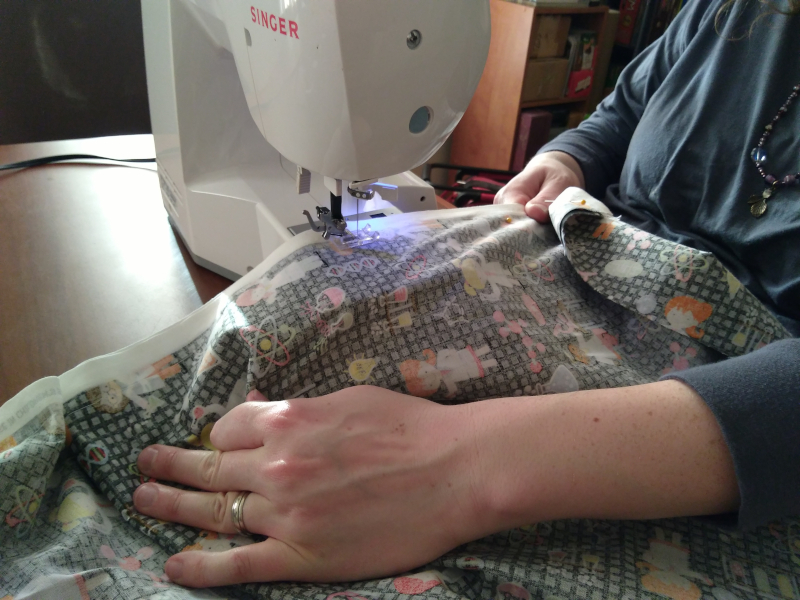
- 41: Learning EmacsSat 05 February 2022
Morgan finally overcomes her fear of Emacs and we talk about Morgan and Christine's respective experiences learning it, and how you can pick it up too!
- 40: Interdisciplinarity and FOSS (SeaGL Keynote)Sun 09 January 2022
Morgan and Christine talk about the skills they’ve learned in their humanities backgrounds and how those have translated into their work within FOSS communities and projects. They’ll then discuss the benefits of seeking out varied skillsets within your communities, the value of looking at problems from multiple lenses, and how to use all of the tools we’ve got to promote our projects. (This episode is the audio from our SeaGL keynote of the same name!)
- 39: The TinyNES: An Open Hardware "Tiny Nostalgia Evocation Square"Thu 16 December 2021
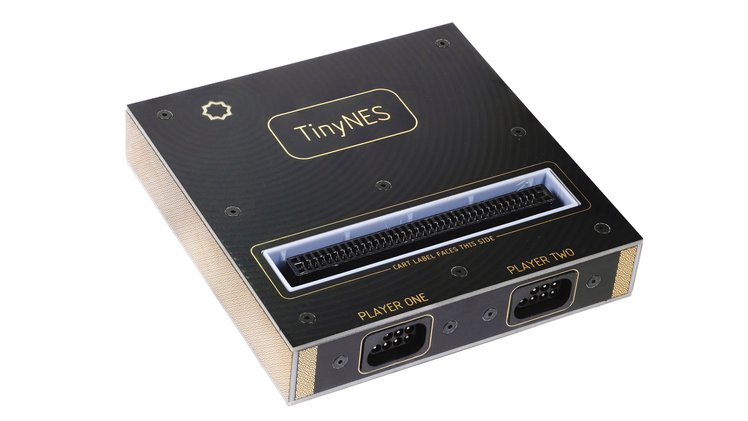
- 38: Spritely Updates! (November 2021)Sun 28 November 2021
It's time for some updates on Spritely, the project Christine founded to advance decentralized networking technology! A lot has happened since our episode about Spritely from last year (which is really where Spritely got its main public announcement)! Most notably, Jessica Tallon has joined the project thanks to a generous grant from NLNet and NGI Zero! But there's a lot more that has happened too, so listen in!
- 37: Salt on Resilience in FOSSTue 02 November 2021
Wm Salt Hale joins us to talk about his dissertation on resilience in FOSS communities (especially after crisis events), the kind of impacts founder decisions can have on long-term community development, especially as seen through reactions to software vulnerabilities and license decisions.
- 36: Topics of interest!Sat 11 September 2021
Lightning round! Morgan and Christine blast through a bunch of snack-sized topics they're currently interested in, ranging from an actual FOSS video game made for the NES, to "Free Soft Wear" clothing, to compiler towers!
- 35: Women and Wool Working in the Ancient Roman Empire, Part 2Mon 30 August 2021
In Part 1 of Women and Wool Working in the Ancient Roman Empire, we discussed the practical matters of textile production in domestic and commercial contexts. In this second episode, we look at the performative ways that textile production was used to construct women's identities. This includes the incorporation of textile tools and production into rites of passage such as marriage, childbirth, and death as a symbol of the virtuous matron. We further discuss religious use and association of textile production through the stories of the Fates, Arachne, and the Virgin Mary. We then come around to weave the rest of the narrative together: could the piece that fits in the women-shaped hole of textile production in ancient Rome be... women?
- 34: Women and Wool Working in the Ancient Roman Empire, Part 1Thu 19 August 2021
In the first of two episodes on Morgan's dissertation we introduce the topic of women and textile production in the Roman Empire. Scholars have often viewed the domestic and commercial divide in textile production along gendered lines, associating domestic production with women in the context of the ideal of feminine virtue and commercial production with men working in centralized production centers. Here we use the cottage industry model to contextualize the role of women’s labor in the Roman textile industry, exploring the links between domestic production and commercial distribution.
- 33: Which Color Should We Paint This Episode?Sun 01 August 2021
In this episode, we discuss "bikeshedding" (also known as the Law of Triviality), the famous proposition that complex contributions and ideas (such as plans to build a nuclear power plant), often of high impact and importance, move forward with relatively little interference, whereas simple contributions and conversations (such as which color to paint a bikeshed) get caught up in committee and high-volume debate, and how this tends to impact FOSS communities. We do a (slightly dramatic) reading of the original email, hold a conversation about it, and then come back to the topic with a twist right after everyone (including ourselves) thought the episode was over.
- 32: Happy FOSS & Crafts anniversary!Tue 20 July 2021
Chris and Morgan reflect on one year of FOSS & Crafts, as well as announcing... FOSS & Crafts Studios!
- 31: Talking Pressbooks and OER with Steel WagstaffSun 11 July 2021
Steel Wagstaff joins us to talk about their work at Pressbooks, a FOSS based book publishing suite particularly focused on Open Educational Resources (OER), as well as talking about OER generally, open access, and education as a fundamental human right!
- 30: Gender and Sexuality, A Personal PerspectiveSun 27 June 2021
On this episode, Chris talks about being nonbinary trans-femme and Morgan talks about being demisexual (and briefly about both being pansexual) and how they have both navigated these experiences in their lives and relationship.
- 29: Building Blocks for User FreedomSat 12 June 2021
Any skillset has basic foundational elements or building blocks. In this recording of Chris and Morgan's talk at ÖzgürKon, we discuss the way that access to those basic elements is limited in modern society. This can be seen in any number of fields from actual building blocks increasingly being sold in sets to make specific toys as opposed to generic buckets of blocks that allow kids to develop their creativity to the way that access to the source code and hardware in our technology is increasingly restricted.
- 28: FOSS Stitch w/ Elana Hashman and Katie McLaughlinSun 23 May 2021
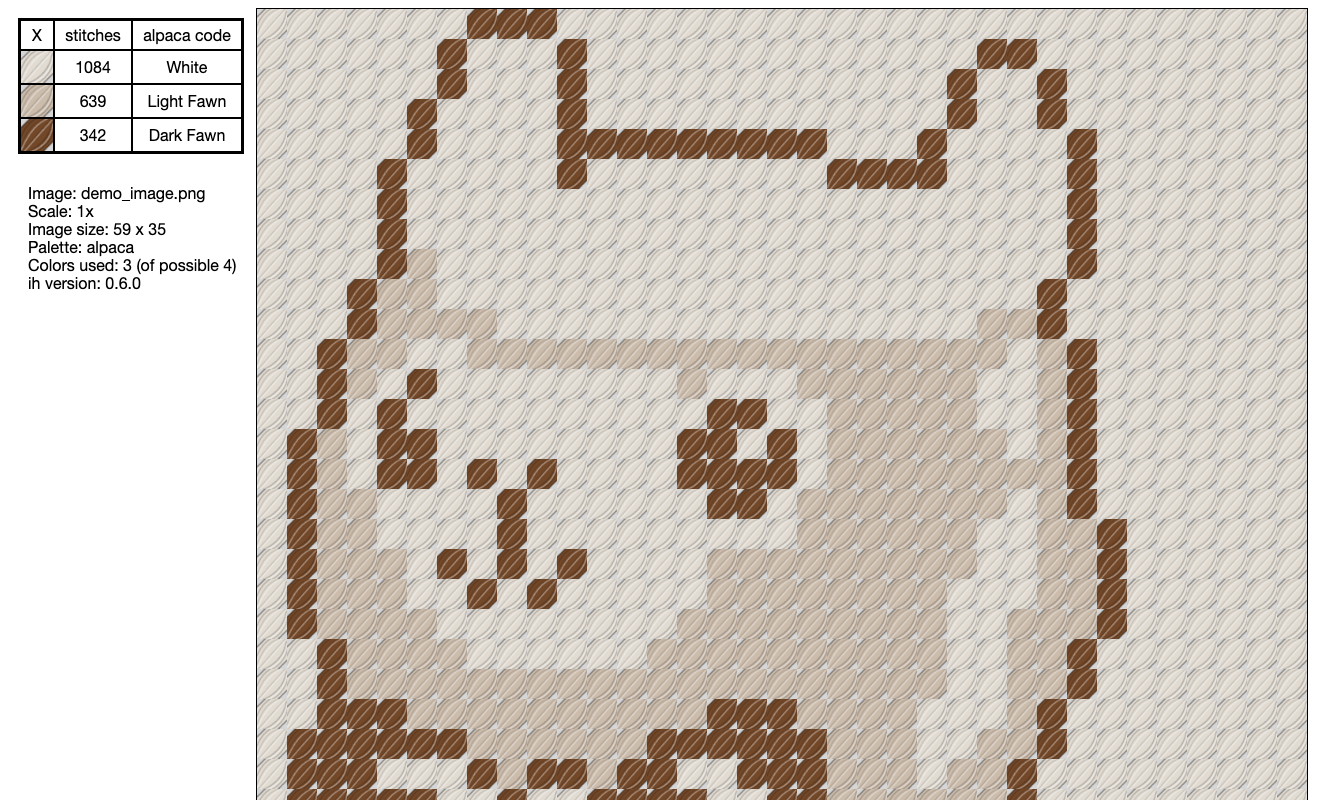
- 27: Nerdout! Game Design and Social SystemsThu 06 May 2021
Steve is back, talking with Chris about viewing social systems through the lens of game design. How do game mechanics, uncertainty, and narrative map onto governance, society, and citizen participation?
- 26: Dr. Morgan Lemmer-Webber, an academic journeyFri 23 April 2021
Remember how we've been saying the entire run of this show "Morgan's hard at work at finishing her PhD dissertation?" Well guess what! She finally got it handed in and defended it... Morgan is now officially Dr. Morgan Lemmer-Webber! (She still has to wrap up a few edits but hey it's official now!)
- 25: Governance, Leadership, and Founder's SyndromeSun 28 March 2021
What story does an institution tell about itself? To whom does a governance structure and its leadership serve? To what degree are leaders within a governing institution subject or exempt to the rules of the governed? We use this framework to discuss the unexpected announcement of Richard Stallman's re-appointment to the FSF board, by the FSF board.
- 24: Get Organized!Fri 12 March 2021
Morgan returns from handing in her dissertation! Very topically, Morgan and Chris talk about organizational systems which can help you stay on track... even when you're working from home or trying to finish your PhD during a global pandemic.
- 23: Nerdout! Fuzzy and crisp systemsSat 13 February 2021
Morgan is in the final crunch of finishing her dissertation draft, so Chris's brother Steve Webber joins us for a special "nerdout": analyzing the dual nature of fuzzy vs crisp systems! From physics to biology, from programming languages to human languages, the duality of fuzzy and crisp is everpresent.
- 22: Crafting the past... or trying toFri 29 January 2021
There's all sorts of reasons to pursue historical crafting techniques: for the experience of recreating them or learning new techniques, for education, or for entertainment and immersion. Morgan and Chris explore these paths under the terms "experiential historical crafts", "experimental archaeology", and "historical reenactment". What is important, useful, and fun about each of these? What pitfalls might we want to avoid? What can be gained by what we might find, how might we bring more people in... and what do we risk by what (or who) we might miss or leave out?
- 21: Vicky Steeves on Reproducibility, Open Research, & Librarians (... and game modding)Sun 17 January 2021
We're joined by Vicky Steeves, a hyper-talented librarian specializing in data management, open and reproducible research, and the overlap between FOSS, free culture, and library sciences! We dive into all of that... plus a bit of crafting... and even... what's this? A discussion of what the FOSS world can learn from the world of game modding (and vice versa)!
- 20: Hygiene for a computing pandemicSun 03 January 2021
Chris and Morgan, driving in the Covid-19 pandemic, reflect on lessons of hygiene and a separation of concerns from the past (seen through the retroactively surprising struggle for handwashing acceptance) while analyzing how to bring safety to today's computing security pandemic via object capability discipline.
- 19: Mallory Knodel on bits and bytes and human rightsThu 17 December 2020
With computing technology becoming integrated with every aspect of our lives, many issues are simultaneously human rights issues and technical issues. Thus, how are organizations concerned with human rights and social justice engaging with technological authorship and policy-making? Mallory Knodel, presently Chief Technology Officer for the Center for Democracy and Technology, explains her work as a Public Interest Technologist. Mallory is also heavily engaged in a wide number of technical standards-making organizations, and explains not only how technical standards are of interest to human rights organizations, but how the origin in work to define human rights overlaps with the emergence of standards-making efforts.
- 18: Sumana Harihareswara on sketching, standup, and maintainershipSun 06 December 2020
We're joined by Sumana Harihareswara, a FOSS advocate yes, but also a person of so many other talents! We talk about sketching, standup comedy, and maintainership for the long life of free software projects. (Did you know you can hire Sumana to help on your FOSS project maintainership btw? Sumana runs Changeset Consulting!) We also talk about representation in the FOSS community within the arts (especially narrative arts), and about learning new skills within "no big deal" contexts.
- 17: Gardening, from seedling to seasonedSat 28 November 2020
We're joined by our friend Tristan to talk about gardening experiences, from newbies (us) to the wise (Tristan and others who are not us). We (Morgan and Chris) have just started seriously gardening this year, and have learned a lot about what works and what doesn't. And it turns out that people who have been doing it for years (such as Tristan) still have a lot of successes but also a lot of failures. But those can be fun too!
- 16: Bassam Kurdali on using Blender for open movie productions and educationThu 12 November 2020
Bassam Kurdali (Fediverse, Twitter) talks about using Blender (a free and open source software suite for making 3d artwork) for open movie projects such as Elephants Dream (the world's first open movie project, which Bassam directed!) and Wires for Empathy, as well as use in teaching it to college students studying animation.
- 15: Scribble and the Open Document FormatThu 05 November 2020
Morgan and Chris talk about the Scribble document authoring format, with Morgan talking about authoring her dissertation in it and Chris talking about writing an OpenDocument Format (sometimes shortened to "ODF" or "ODT") exporter. (That code is now a merge request which will hopefully become part of Scribble itself!)
- 14: Digital Humanities WorkshopsSat 31 October 2020
Morgan and Chris discuss the Digital Humanities workshops they ran introducing non-programmers to Racket and Scribble.
- 13: ActivityPub Conference 2020 with Sebastian LasseThu 15 October 2020
This week we are joined by Sebastian Lasse, author of the Redaktor ActivityPub powered CMS, and co-host of both ActivityPub Conference 2020 and ActivityPub Conference 2019 along with Morgan. Lots of retrospective, especially on the difference between APConf as an online conference in 2020 vs an in person conference in 2019.
- 12: [Theatre] The What Goblins Saga, Chapter 2: Trees, Friends, and StaticThu 08 October 2020
On this episode of FOSS and Crafts Theatre, we continue the What Goblins Saga. The What Goblins saga continues as the characters continue to learn about themselves and their ever-changing environment. If you haven't listened to Chapter 1, maybe stop reading now to avoid spoilers from that episode!
- 11: An Ethics of AgencyThu 01 October 2020
Chris and Morgan discuss an ethical framework Chris has been workshopping for the last few years, "An Ethics of Agency", with the foundation of maximizing agency "for you, for me, for everyone" and minimizing subjection. CW: Note that Chris talks about an incident involving them experiencing suicidal depression at one point.
- 10: [Theatre] The What Goblins Saga, Chapter 1: What Are Goblins?Thu 24 September 2020
On this episode of FOSS and Crafts Theatre, we begin exploring "The What Goblins Saga". While the claim of "our goblins are different" is hardly new, these goblins seem to stand apart more than most... even their fellow goblins seem to think so. What is the nature of goblins, and what about The What Goblins in particular? Through little planning or foresight, our motley crew is about to find more answers than they expected... which only opens up more questions, of course...
- 9: What is Spritely?Thu 10 September 2020
What is this Spritely project that's taken up most of Chris's time for the last several years? Something about advancing distributed/decentralized social networks, but what does that mean? Chris and Morgan talk about it while they drive to the bank!
- 8: Stefano Zacchiroli on preserving source code at Software HeritageThu 03 September 2020
We are extremely excited to have on our first FOSS & Crafts guest: Stefano Zacchiroli! (Also known on some corners of the FOSS world as just "zack".) Stefano has a long history of FOSS advocacy, most famously for his role in Debian where he served three well-regarded terms as Debian Project Leader. These days zack works on Software Heritage, an archival institution for software source code. We talk about how Software Heritage plays a role in common with other GLAM institutions (which stands for "Galleries, Libraries Archives and Museums").
- 7: [Theatre] What Escaped from the Demonic Z.O.O.O.O. (part 2)Thu 27 August 2020
Leaving off from part 1, the office demons of Styx, Hexia, and Gummy Bear (or is it Gerumphy or perhaps Gzeumphi Behr?) track down and confront the mysterious lampmorel creature directly. What dangers await them? And just what secrets are the corporate overlords of Demonstrative Industries and Plentimint Industries both keeping (perhaps even from each other)? Find out in this thrilling conclusion!
- 6: [Theatre] What Escaped from the Demonic Z.O.O.O.O. (part 1)Thu 20 August 2020
On the first ever episode of FOSS and Crafts Theatre (a new subshow of FOSS and Crafts), Chris and Morgan are joined by veteran role playing game players Nick and LP to bring everyone a story of three demonic employees of the international conglomerate, Demonstrative Industries. Something has escaped from the Demonic Z.O.O.O.O. to the human realm, and its up to our demon heroes to clean up the mess before anyone finds out. Can they succeed in their mission and keep their corporate overlords pleased with them, or will things get dramatically out of hand... or perhaps something in-between? Find out on today's episode (part one of two)!
- 5: Milkytracker, chiptunes, and that intro musicThu 13 August 2020
Chris's journey of making the intro music is used as a backdrop to explore how to make music in Milkytracker, a FOSS program for making tracker music, as well as to explore a bit of sound theory, what chiptunes and tracker music are, and even a bit of exploring what it's like to learn something new even when you aren't necessarily very good yet.
- 4: The Eight Kinds of FunThu 06 August 2020
Morgan and Chris look at the domains of FOSS and crafts from the lens of the Eight Kinds of Fun, traditionally used to analyze game design. What kinds of ways do different people enjoy participating in creative activities? How can examining those help us understand how to grow our communities to accomodate different participants with different styles of interests?
- 3: Textile production and a nostalgic pastThu 30 July 2020
These days textile production is mostly automated aside from some niche markets and craft production. Craft production of textiles today taps into a vision of a nostalgic past, often evoking memories of a time the audience member wasn't there for. It turns out this potent imagery has been used not just for inspiring hobbyist crafters everywhere to pull out the drop spindle and knitting needles, but also by political participants going back all the way to (at least) Ancient Rome to try to steer a particular narrative. Follow some of that history from past to present, and hear from Morgan about how the whole process of textile production works starting from raw materials... from sheep to sweater!
- 2: The impact of machines that "learn" and produceThu 23 July 2020
The results from machine learning have been getting better and better and the results seen so far from OpenAI's GPT-3 model look stunningly good. But unlike GPT-2 (which was publicly released under a free license), so far GPT-3 is accessible via API-only. What's the reasoning and possible impact of that decision? For that matter, what kind of impacts could machine learning advancements make on FOSS, programming in general, art production, and civic society?
- 1: Collaborative Storytelling with DiceThu 16 July 2020
You've probably heard of "tabletop Role Playing Games" (or, tabletop RPGs) before, but what are they? In this episode, Chris and Morgan introduce a subset of RPGs called "Narrative RPGs" whose mechanics are focused primarily around storytelling (as opposed to tactical combat).2 Hear about how narrative RPGs can be used as "collaborative storytelling with dice", some of the narrative RPG systems that exist, as well as an in-depth look at one particular RPG system, Freeform Universal. Freeform Universal is so simple and easy to pick up that by the end of this episode, you should have enough information to use it for weaving stories with your friends!
- Episode 0: Welcome to FOSS and Crafts!Wed 15 July 2020
Here it is, the very first episode of FOSS and Crafts! Co-hosts Chris and Morgan introduce themselves, their backgrounds, and give some sense of what to expect from the show.
